Stuart Forster provides a soljanka recipe and reports on visiting the Dresden Christmas market in Germany.
Disclosure: Some of the links and banners below are affiliate links, meaning, at no additional cost to you, I will earn a commission if you click through and make a purchase. This post is paid for by Titan Travel, who did not review or approve this post. It was written in collaboration with Titan as a part of the Blogmas campaign.
Seasonal cuisine has been sold at Dresden’s Striezelmarkt since the market’s inception back in the 15th century. The Christmas market was first documented in 1434, allowing locals to claim it is Germany’s oldest. Over time it has grown to encompass more than 250 stalls and now draws travellers from around the planet.
The Striezelmarkt is held each Advent on Dresden’s cobbled Altmarkt, the city’s oldest market square. It was originally a one-day event at which locals would purchase provisions for their Christmas feast.
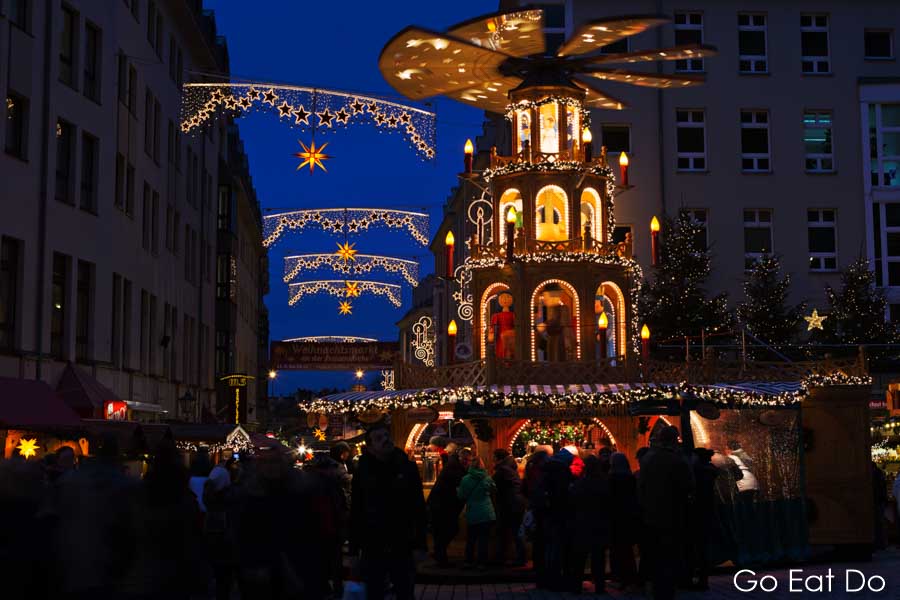
Flavours at the Striezelmarkt
On chilled winter evenings, city residents mingle with visitors to socialise while sipping cinnamon-laced Glühwein (mulled wine) served in colourful mugs. Anyone asking for one ‘mit schuss’ is looking to get a shot of spirit, normally rum, added to their steaming drink.
It’s a good idea to grab a bite to eat before you down too many of those. Fortunately, there are snacks aplenty to be had at the Striezelmarkt.
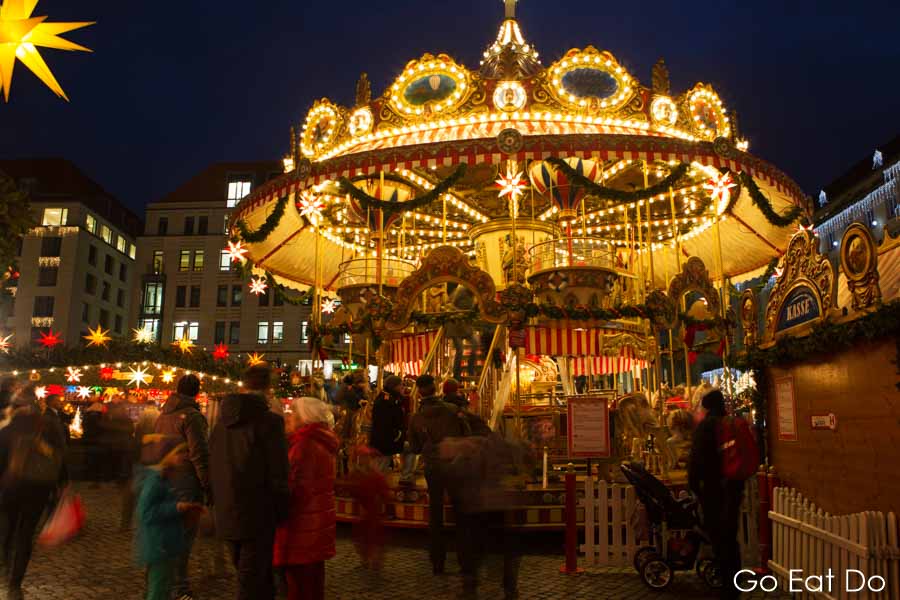
Bratwurst from neighbouring Thuringia, roasted over charcoal, is an ever-popular dish and delicious when served with a dollop of mild mustard made in the Saxon town of Bautzen. Don’t be surprised if you smell Bohemian Rauchwurst — smoked sausage — sizzling too. After all, Prague is less than 150 kilometres (around 90 miles) from Dresden. You’ll even find a stall serving game and horsemeat sausages at the Striezelmarkt.
I’ve visited Dresden’s best-known Advent market many times and have friends from the region. It’s an informal tradition for them to encourage newcomers to try a plate of Kartoffelpuffer — scone-sized pancakes made from grated potato served with apple sauce for dipping — on arrival at the market.
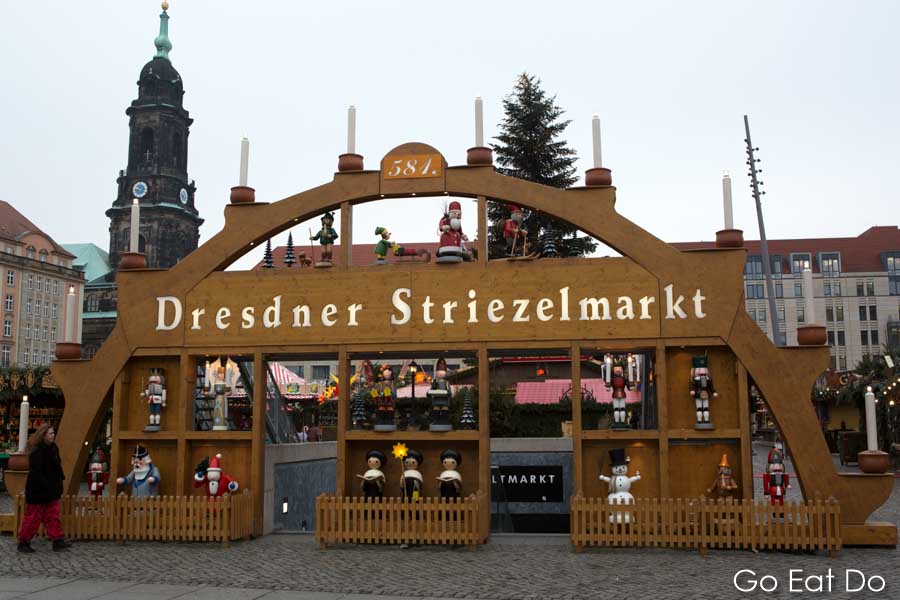
What to buy at Dresden’s Striezelmarkt
Shuffling between stalls to load up on food and drink brings opportunities to view handcrafted wooden Christmas decorations. The wares include stylised figures carved in the Ore Mountains, known as Räuchermänner. Lighting tiny cones of incense make the painted figures look as if they are puffing away on a pipe.
Sugar-dusted Dresdner Stollen, a traditional style of seasonal fruitcake, is sold at several Striezelmarkt stalls. City residents claim true Dresden Stollen uses significantly less sugar than the mass-produced cakes that are available across Germany and beyond.
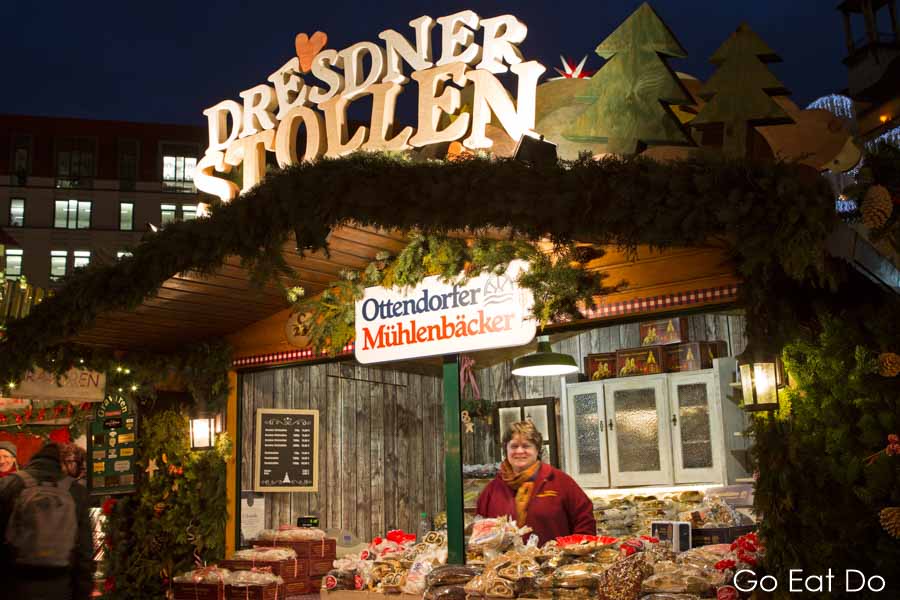
Where to enjoy the best views of Dresden
One of the best places to get an overview of the famous Christmas market is from the nearby tower of the Lutheran Kreuzkirche — the Church of the Holy Cross. The observation platform, at a height of 54 metres above the market square, can be reached after climbing 259 steps. It looks magical at dusk.
You can also view the square from the platform 67 metres up on the dome of the Frauenkirche — the Church of Our Lady. The church collapsed on 15 February 1945 following aerial bombardment by Allied forces. For decades the city centre ruin was a reminder of the destruction wrought by Western powers during World War Two. Since its rededication, in 2005, the sleek silhouette of the Frauenkirche has doubled as an icon of the city.
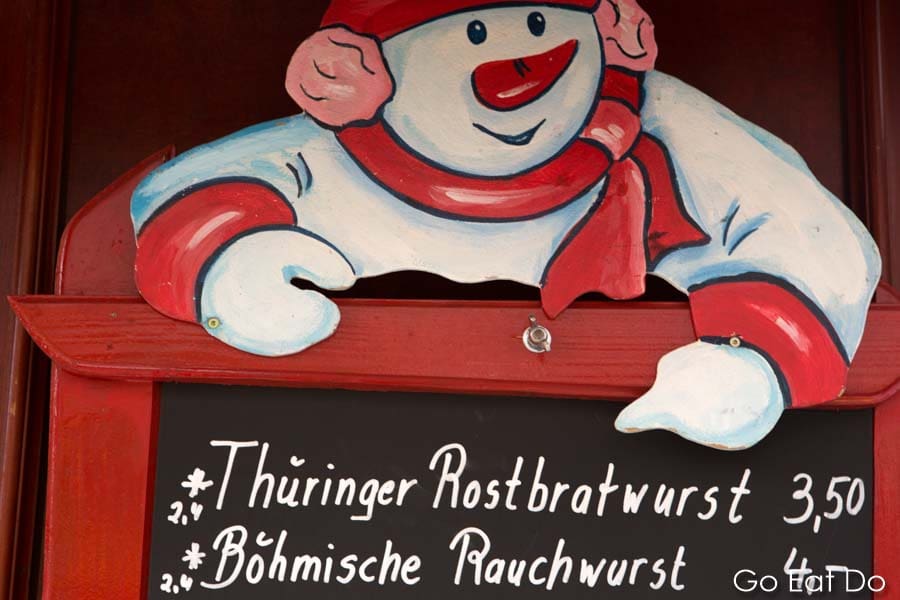
The Neumarkt — meaning ‘new market’ — also hosts an Advent market with wooden stalls. Strolling from the Frauenkirche along Münzgasse will take you past a handful of stalls on the way to the River Elbe.
One of my favourite sights in Dresden is the Fürstenzug — a tiled depiction of Saxony royalty running the length of a wall. It’s worth meandering by on the way to Dresden’s Castle and the city’s famous opera house, the Semperoper.
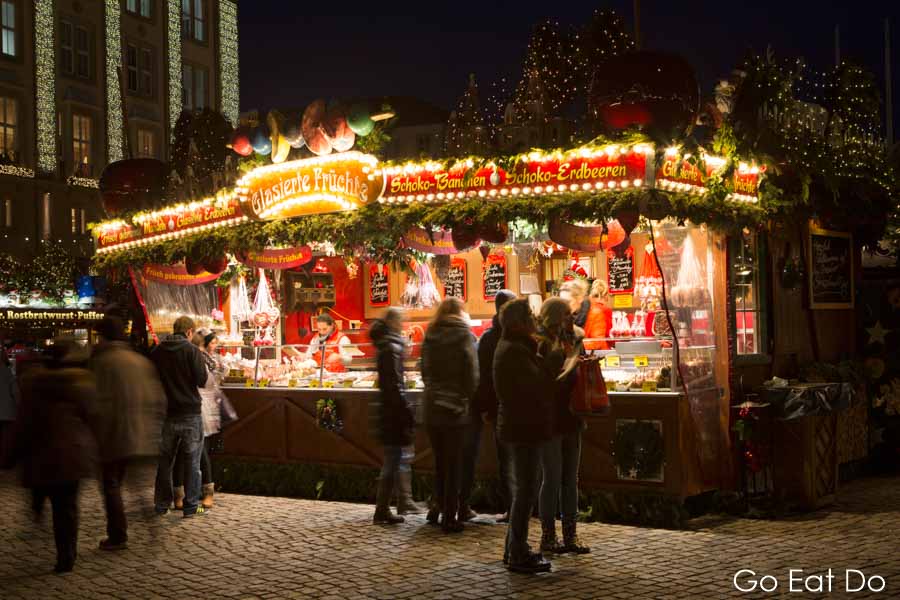
Dining out in Dresden
Traditional Saxon cuisine is hearty and tends to be ideal for winter nights. Schnitzels and Saxon potato soup feature on the menu of the Weinstube zum Rebstock (Hauptstrasse 17; tel. +49 (0)351 563 3544), which serves a selection of regional wine by the glass.
If you prefer beer, head into the Altmarktkeller (Altmarkt 4; tel. +49 (0)351 481 8130), a beer cellar handily placed next to the Striezelmarkt. One of my favourite dishes on the menu is Soljanka, a soup with Russian origins.
Friends tell me that occupying Soviet troops introduced the soup to eastern Germany. To most residents of Saxony, it proved more palatable than the presence of a foreign military power. Soljanka has remained popular following German reunification.
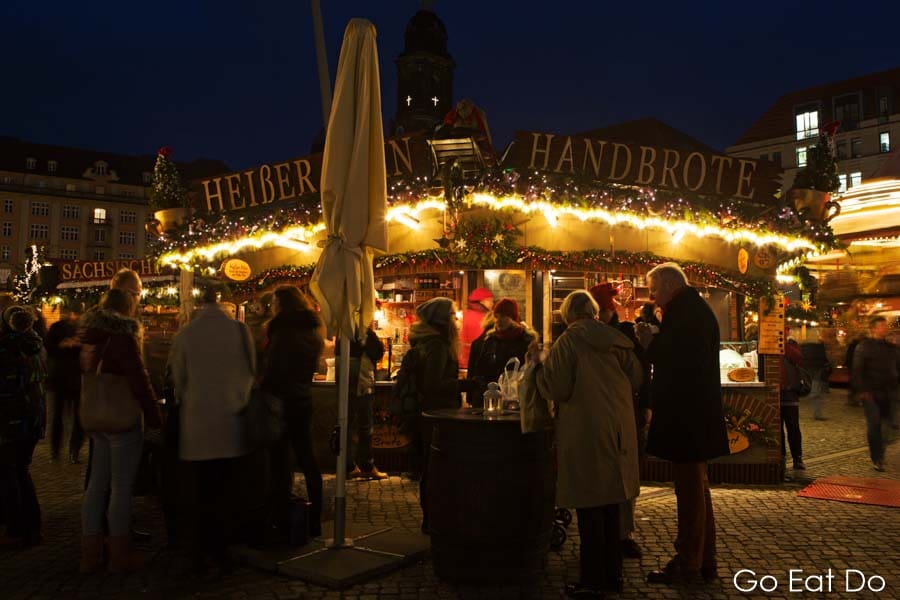
Grandmother’s style Soljanka recipe
Soljanka is one of those recipes that you can adapt to whatever you have available. It can be served with meat or fish. The soup has a spicy paprika-tomato base.
The preparation takes around 15 minutes. The cooking time is about 30 minutes.
Ingredients
Serves four:
3 onions
3 capsicums (the peppers can vary in colour)
3 cloves of garlic
200 grams of salami
200 grams of meat (e.g. pork chop)
85 grams of unsmoked pancetta (or bacon)
500 grams of passata (or tomato juice)
4 gherkins
3 heaped tablespoons of tomato puree
1 vegetable stock cube
2 heaped teaspoons of brown sugar
Soured cream
1 lemon
A heaped teaspoon of paprika powder
1/3 teaspoon of chilli powder
Oil for frying
Salt and pepper to season
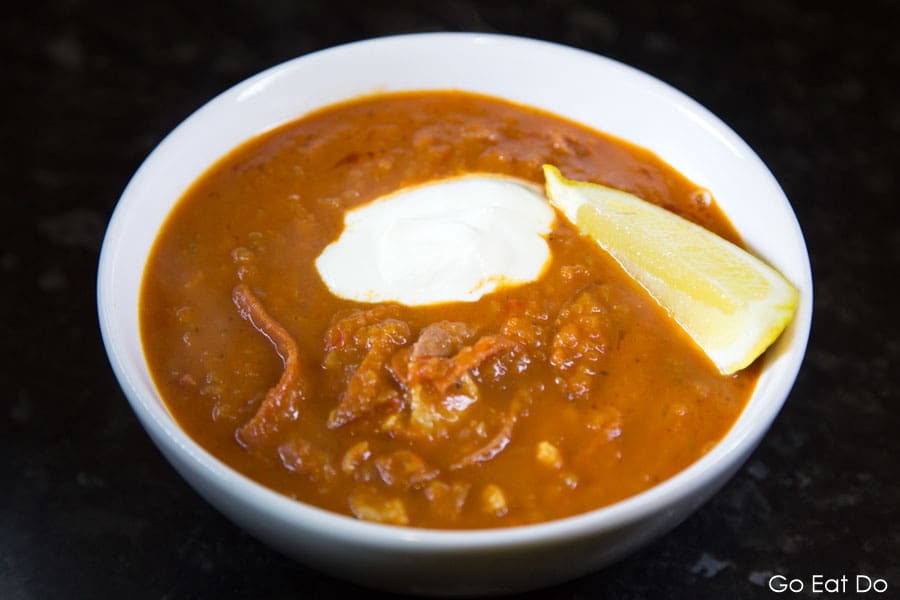
Method
- Chop the vegetables and fry them in a large pan until they soften. Add the paprika, chilli, the sugar and crumble in the stock cube. Pour in the passata and add a cup of water. Simmer for 10 minutes then use a blender to smooth the mixture.
- Slice the salami and meat into small pieces. Dry fry along with the pancetta (or bacon).
- Serve the soup in bowls. Share the meat and stir it in.
- Garnish the soljanka with a spoonful of soured cream, a wedge of lemon and sliced gherkin.
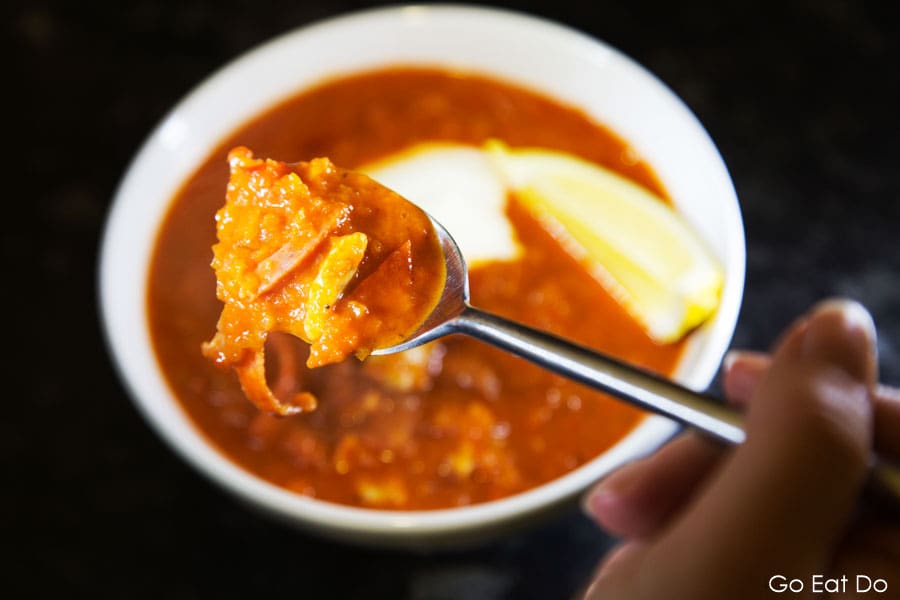
Further information
Titan Travel has been organising escorted tours to destinations around the world since 1978, including Germany. For more travel inspiration, and seasonal culinary ideas, view Titan’s website.
Dresden is in a region that’s known as the Cultural Heart of Germany, consisting of three states, including Saxony. The Dresden Strizelmarkt is open until 24 December.
Photos illustrating this post are by Why Eye Photography.
If you enjoyed this post why not sign up for the free Go Eat Do newsletter? It’s a hassle-free way of getting links to posts on a monthly basis.
‘Like’ the Go Eat Do Facebook page to see more photos and content.
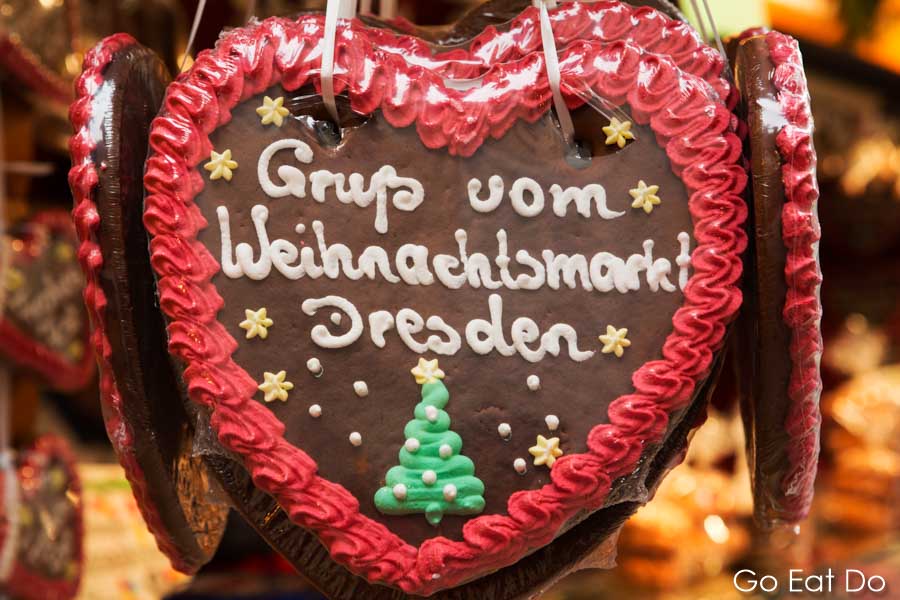



Agness of Fit Travelling
December 11, 2017 at 12:29Dresden seems so charming during Christmas time, Stuart. Excellent post and stunning pictures. I am definitely adding this Christmas market and their mulled wine to my bucket list! 😉
Stuart Forster
December 11, 2017 at 16:56Thank you, Agness. Enjoy your visit there, there’s lots to do and see.
Barry Stephen
December 18, 2017 at 14:37The Christmas markets in Germany are great places to visit, in my opinion. The market at Nuremburg is probably my favourite. I’d like to see the one in Dresden after reading this.
Stuart Forster
December 18, 2017 at 17:57Make sure you head to the Striezelmarkt if you do get to Dresden before Christmas.
Sally Anderson
December 20, 2017 at 15:33This sounds a fabulous city to visit for the Christmas markets. It’s on my list of places to visit in 2018.
Stuart Forster
December 20, 2017 at 16:15Enjoy your visit!
Geoff Moore
December 21, 2017 at 16:09Great feature another German city to put on a visit list !
Stuart Forster
December 22, 2017 at 10:15Thanks Geoff. Definitely once to visit if you enjoy traditions, history and interesting architecture.
Kathryn
December 23, 2017 at 11:16I try and visit a new Christmas market every year as I love photographing them but I’ve not managed to make one this year. Thank you for this Christmas market fix. Lovely photos.
Stuart Forster
December 29, 2017 at 10:22Thanks Kathryn, the one in Dresden is certainly worth considering for your future Christmas market trips and has lots to photograph.